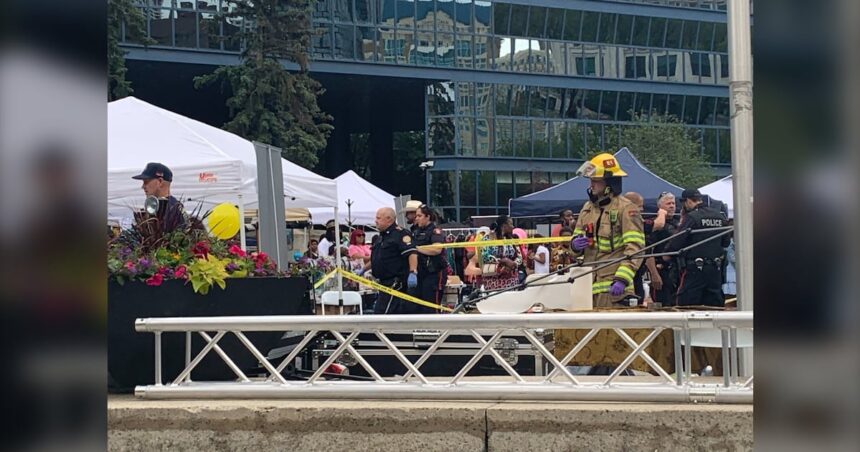I settled into the back of the press area as emergency vehicles flashed blue and red against the evening sky near Calgary’s City Hall. What began as a celebration of culture became a scene of chaos after a temporary structure collapsed at a Nigerian-style market Friday evening.
According to Calgary EMS, multiple people sustained injuries when the structure gave way around 7 p.m. at the cultural market set up in the Municipal Plaza. From what I observed, paramedics treated several individuals on site while others were transported to local hospitals.
“We had crews respond to the area of the Municipal Plaza for reports of a tent collapse,” Calgary EMS spokesperson Stuart Brideaux told me when I caught up with him near the scene. “Upon arrival, paramedics found multiple patients requiring assessment.”
The mood shifted dramatically from the festive atmosphere that had filled the plaza earlier. Witnesses described hearing a sudden cracking sound before the temporary canopy structure collapsed onto vendors and shoppers below.
Emma Livingston, who had been browsing handcrafted items with her daughter, said the collapse happened without warning. “One minute we were looking at beautiful fabrics, and the next there was this awful sound and people started screaming,” she explained, still visibly shaken.
Calgary Police quickly established a perimeter around the site while emergency teams worked to ensure all victims received prompt medical attention. Officers interviewed witnesses and documented the scene, though they haven’t yet released details about what might have caused the structural failure.
The market had been organized as part of Calgary’s ongoing cultural showcase initiative, which aims to highlight the diverse communities that make up the city’s growing population. The Nigerian-themed market was meant to run through the weekend, featuring traditional foods, crafts, and performances.
City Councillor Terry Wong arrived at the scene shortly after the collapse. “Our immediate concern is for those injured in this unfortunate incident,” Wong said. “We’re working closely with emergency services to understand exactly what happened here today.”
According to early reports from the Calgary Fire Department, wind may have been a contributing factor. Weather data from Environment Canada shows gusts reached up to 40 km/h in the downtown core Friday evening, though officials stressed it’s too early to determine the exact cause.
Market organizer Chioma Nnadi was visibly distraught when I spoke with her briefly at the edge of the police cordon. “We followed all the proper permitting procedures and safety protocols,” she insisted. “Our thoughts are with everyone affected by this terrible accident.”
The City of Calgary issued a statement confirming they will conduct a thorough investigation into the structural failure. “The safety of Calgarians is our highest priority,” read the statement from the Mayor’s office. “We are committed to understanding what occurred and taking appropriate measures to prevent similar incidents.”
For longtime Calgarians, the scene brought back memories of the 2009 Big Valley Jamboree stage collapse in Camrose that claimed one life and injured dozens when high winds toppled the main stage during a country music festival.
Calgary’s Nigerian community has grown substantially over the past decade, with Statistics Canada reporting a nearly 35% increase since 2016. The cultural market was intended to showcase Nigerian entrepreneurship, artistry, and cuisine to the broader Calgary population.
As darkness fell over downtown, emergency lights continued to illuminate the plaza while crews worked to secure the site. City officials announced that the remainder of the weekend market events would be cancelled while the investigation continues.
Local resident Michael Chen stopped to watch the emergency response from across the street. “It’s heartbreaking to see this happen during what should have been a celebration,” he said. “These cultural events are what make Calgary special.”
The incident raises questions about the approval process for temporary structures in public spaces. According to municipal regulations posted on the City of Calgary website, all temporary installations in public areas require permits that include safety inspections.
The Calgary Emergency Management Agency advises that anyone who witnessed the collapse or has information that might assist investigators should contact their non-emergency line.
As crews began the careful process of dismantling the damaged structure, the sense of community remained strong. Several local businesses opened their doors to those affected, offering water and places to rest while waiting to speak with authorities.
The resilience of Calgary’s cultural communities has been tested before—from the devastating 2013 floods to the economic challenges of recent years—but as one community volunteer told me while helping direct people away from the scene: “We’ll come back stronger. That’s what Calgarians do.”






